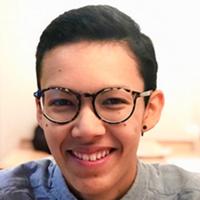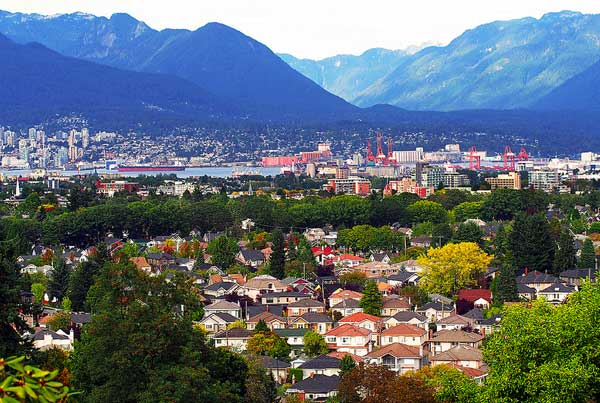What's your definition of a world's greenest city? On Thursday, about 300 people gathered at SFU Woodward's to present their visions, concerns and critiques. Now, at the bottom of this piece, you have your chance to add your views to an unfolding recipe for a truly sustainable Vancouver -- or any city, for that matter.
Thursday's event, titled This City in Seven Years: My Greenest City, marked the kick-off of Spur Vancouver's four-day ideas festival last week. The evening, moderated by Tyee editor David Beers, began with eight panelists given five minutes to make their case.
Other participants were given the opportunity to comment. Then members of the audience were able to pose questions to the panel and share their requirements if Vancouver is to earn the title it seeks. The resulting checklist of greenest city criteria is presented below. Read through it, please, then add your own perspective in the comments section.
Panelist Michael Ableman, an organic farming pioneer and co-founder of the Sole Food Street Farms Project in Vancouver:
... we start thinking of ecological issues as related to social issues.
... everyone has a place to go home at night, food to eat, water to drink.
... we start thinking of food not in isolation, but as relationships.
... we start looking deeply into the foundations of the city -- socially, economically, environmentally, etc.
... we understand Vancouver as a part of a whole and recognize its interconnectedness with other places in the world.
... everyone starts taking part in the process of making Vancouver green.
... we start getting uncomfortable about how things are and react.
... we take the conversation offline and start turning our ideas into reality.
Panelist Christine McLaren, a freelance journalist who investigates solutions to urban problems:
... those that are going to make it green can afford to stay here.
... the city we live in invites creative, innovative enterprise.
... we are able to retain young innovators with appropriate housing and public transit.
... we understand affordability and greenness as interconnected.
... we begin exploring different build forms that cater to a variety of different people -- for example, by building for flexibility as opposed to requirements.
Panelist Charles Gauthier, president and CEO of the Downtown Vancouver Business Improvement Association:
... we increase density along public transit routes.
... the commercial sector matches how the residential sector deals with waste.
... we improve Vancouver's transit score -- big investments on bus services, move forward on other transportation programs, etc.
Panelist Gordon Price, director of The City Program at Simon Fraser University and a former Vancouver city councillor:
... we continue to invest in the trends that were established by previous generations.
... we say 'yes' to public transit -- by building transit to a scale we have not seen before, connecting the suburbs to the rest of the region.
Panelist Christianne Wilhelmson, executive director of the Georgia Strait Alliance since 2010:
... we change how we talk about the greenest city, and start thinking blue.
... the economic drivers in our waterfront can be sustainable.
... ports are in balance with social and economic needs as well as environment needs.
... we have a difficult conversation about what goes through the ports -- bitumen, uranium?
... we set measurable and attainable objectives for the greenest city.
... we break down the old framework, build a new one and start having conversations with new partners.
Panelist Sadhu Johnston, Vancouver's Deputy City Manager and former deputy chief of staff to Chicago Mayor Richard Daley:
... we reduce our carbon emissions (by 23 per cent) and resolve our addiction to fossil fuels.
... we address affordability by making the city greener.
... we produce the energy we consume locally.
... we get rid of our cars and use public transit.
... we are assured that Vancouver's harbour is not a thoroughfare for massive bitumen-laden tankers.
Panelist Geoff Dembicki, a staff reporter for The Tyee, having travelled from Vancouver to San Francisco to New York to answer the question, "Are we screwed?":
... we create a holistic blueprint with values that are consistent with those of Vancouver residents.
... we can do what Hawaii did and think about what we want sustainability to reflect, what symbols we want it to represent.
... we begin to see sustainability as a necessary path to a more just and equitable society.
Panelist Mitra Mansour, a Vancouver-based designer, founder of Creative Room and a steering committee member of the Vancouver Design Nerds:
... we live in a place organized to enable all its citizens to meet their own needs without endangering the environment and threatening the needs of other people.
... we understand the city as a part of a bigger ecosystem.
... we stop thinking about ourselves selfishly and consider the consequences of our actions.
... we bring the power back to the people and build a collective voice -- human-centered design.
... we challenge existing paradigms about the materials we use -- think new and think better.
Members of the audience:
... we make the lanes and alleys in the downtown business and residential areas productive areas for growing food (suggested by Greg Aulin).
... we consider how pricing might contribute to finding transport for all and reducing emissions.
... we connect neighbors, build trust and mobilize these people at the very local level in exploring solutions to hyper consumption and the climate crisis.
... we reconsider what things are necessary for us to live.
... we provide more accessible education for Vancouver's community members -- too many people are not aware about the issues.
... citizens can influence the industry effectively.
... Vancouver is able to integrate with the natural environment, as well as the province, the country and the world and share the successes equitably.
... we say "no" to the Kinder Morgan proposal -- think about the economies that we want to drive our city (stated by Coun. Andrea Reimer).
... we include indigenous peoples in the conversation about what it means to be green and how we can get there.
... we stop wasting homes and buildings and focus on creating a way for older structures to be green.
... we consider the needs of those who bike -- being able to lock a bike downtown without worrying about theft, perhaps by creating keyless bike storage systems.
... we have 100 per cent renewable energy powers for all city, commercial and residential buildings as well as transportation.
... we control population growth, educate people, encourage infiltration of precipitation into the ground, discourage the use of plastics, prevent water from washing cars from entering storm drains and ban the use of anti-bacterial soaps.
... we involve students in bringing these ideas into fruition.
... we improve public transport, increase/improve bicycle infrastructure and build pedestrian-friendly streets.
... we have more urban gardens, rooftop gardens and agriculture.
... after transit is in place, we institute more tolls on roads and bridges to get people out of their cars and we charge a fee for vehicles to enter the downtown, with exemptions for residents and essential service vehicles.
... we integrate affordability into our green vision, providing more housing opportunities for people in the city.
... we create mixed-income neighborhoods or buildings, instead of "shipping out" the creative and innovative class.
... we are able to convince people who don't care to care.
Share your ideas of what it means to be the greenest city in the comment section below. ![]()
Read more: Municipal Politics, Environment
















Tyee Commenting Guidelines
Comments that violate guidelines risk being deleted, and violations may result in a temporary or permanent user ban. Maintain the spirit of good conversation to stay in the discussion.
*Please note The Tyee is not a forum for spreading misinformation about COVID-19, denying its existence or minimizing its risk to public health.
Do:
Do not: